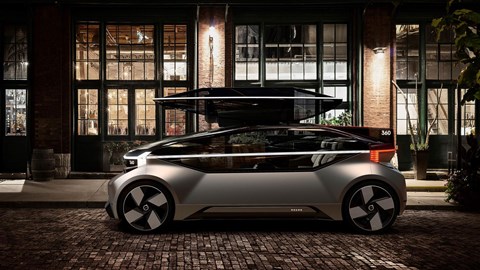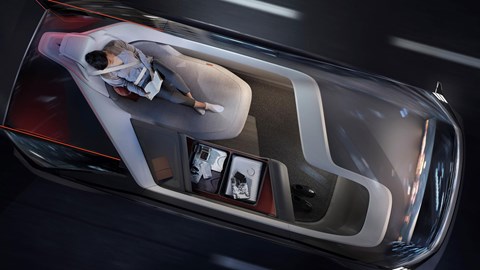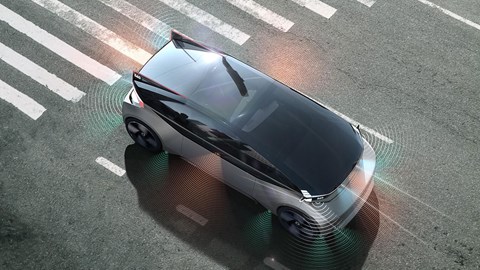► The autonomous Volvo 360c
► Aims at short-haul flights
► Up to 180-mile range range
Volvo has unveiled a new vision that it believes could replace short-haul flights. Called the 360c, the new autonomous concept has a highly stylised exterior – but features an interior Volvo believes is the future of travel.
Somewhere between business class and a contemporary car interior, Volvo says the new cabin allows for the four main activities of travel: sleep, work, relaxation and entertainment.
And don’t worry: this is nothing to do with the old, Dutch-built Volvo 360 rival to the VW Golf. This one’s aiming much, much higher than that…

‘Autonomous vehicle concepts have a tendency to become a technology showcase instead of a vision of how people use it,’ said Robin Page, senior vice president of design at Volvo. ‘But Volvo is a human-centric brand. We focus on the daily lives of our customers and how we can make them better. The 360c is the next iteration of this approach.’
Volvo wants to replace planes, you say?
Sort of. Of course, the Volvo 360c won’t be replacing any transatlantic or overseas flights any time soon, but it could offer a decent alternative to short hops across land. In theory, it makes sense…
‘Domestic air travel sounds great when you buy your ticket, but it really isn’t. The 360c represents what could be a whole new take on the industry,’ said Mårten Levenstam, senior vice president of corporate strategy at Volvo. ‘The sleeping cabin allows you to enjoy premium comfort and peaceful travel through the night and wake up refreshed at your destination. It could enable us to compete with the world’s leading aircraft makers.’

We’ve seen this sort of design before – several times in fact – but we’ve never seen a car maker pitch autonomous tech as an alternative to mundane problems of short-haul flight. Perhaps this is what Volvo means by human-centric design.
The speed of this transport isn’t mentioned either; while it could well be more enjoyable and easier to take the 360c rather than the red-eye – would it actually be much quicker?
Levels 1 to 5 of driverless tech explained
The Volvo 360c: it’s electric, obviously
Those issues aside, there’s also the issue of range. As you’d expect from these sorts of concepts, the 360c is also electric, so it’d only be targeted at journeys around 300km (186 miles). Because it’s autonomous too, it’d rely on an existing, robust infrastructure for driverless cars – which in reality means it’s quite a few years away.

However, Volvo isn’t too keen on the growing trend of semi-autonomous cars, and instead favours a ‘car-to-car’ and ‘car-to-x’ based system; the new Volvo 360c doubles down on that vision.
Would you take a 360c over an Easyjet? Let us know in the comments below…
All our Volvo reviews